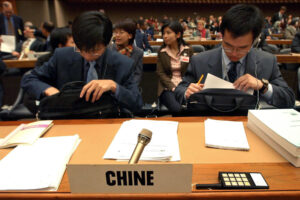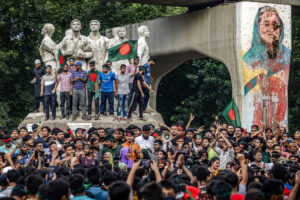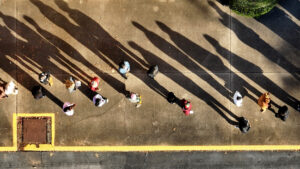Venezuela, Authoritarian Like No Other
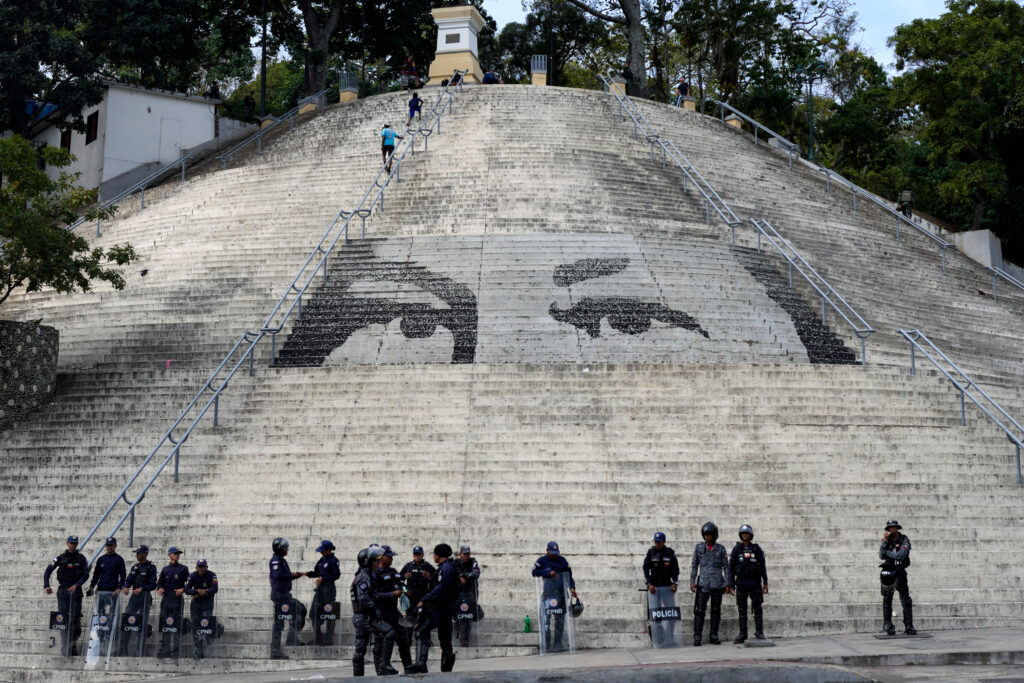
On Jan. 10, in a tightly guarded ceremony at the Legislative Assembly in Caracas, Nicolás Maduro was sworn in for a third term as president of Venezuela. There were no major international figures in attendance, except for his allies from Cuba and Nicaragua, and there were no large rallies in the streets—evidence that the regime Maduro inherited from Hugo Chávez, which has been in power for more than 25 years, was now entering a new era.
In fact, Maduro’s latest inauguration consecrated what may be the most blatant fraud in the electoral history of Latin America (and Latin America knows electoral fraud). The very night of Venezuela’s presidential election in late July, the government simply declared Maduro’s victory outright, a result that it hasn’t been able to prove or justify since.
In the following months, supporters of the ruling party closed ranks behind their leader and rejected attempts at mediation by the Brazilian and Colombian governments. By the time Maduro was sworn into office earlier this year, he was more alone but no less determined to do anything to stay in power—including political persecution, repression and illegal detentions. And he was no less given to grandiose displays than before: The day before the inauguration ceremony, hundreds of drones drew his portrait, smiling, in the Caracas night sky. But with its decision to sustain this electoral lie, his government only proved its weakness and took another step toward building a very singular type of authoritarianism.
Venezuela is unique in various ways. It is Latin America’s only petrostate. Its GDP dropped by about three quarters between 2014 and 2021. Some 7.9 million of its people, or about one-quarter of the population, left the country between 2014 and 2024—one of the greatest population displacements in the world. And it, alone in the world since the fall of the Berlin Wall, has declared itself to be socialist. Why wouldn’t Venezuela’s very political regime be unique as well?
Maduro exercises what might be called “chaotic authoritarianism.” It is a system that results not from meticulous planning but from a series of improvised decisions and in which control is exercised not down a pyramid of power, but via disorganized processes and internal groups that clash with one another. Venezuela has also become a cautionary tale, especially for fragile democracies in Latin America: The road to authoritarianism may be winding but it can be quite short.
A Brief History of De-democratization
If Venezuela became an authoritarian regime in 2015, democratic degradation had started years, even decades, earlier. In the late 1970s, the country’s model of modernization, urbanization, and oil-based growth—which had expanded the middle class and had created a cultural scene that was the envy of Latin America—began to show signs of decline. In 1989, during President Carlos Andrés Pérez’s second term, the army brutally repressed a wave of massive protests known as the Caracazo. That laid bare growing social unrest and gave rise to a group of military officers who, under Chávez’s leadership, attempted a coup d’état.
When Chávez did come to power a decade later, via the ballot box, he promised to rebuild the country on new foundations. During his first inauguration in 1999, he swore on what he famously called “this moribund Constitution.” Within a couple of years he had changed it, along with almost all the institutions of the ancien régime. His administration restored optimism among a large sector of Venezuelan society, the poor and the excluded: He seemed to understand their hardships, and their living conditions improved thanks to a series of new social programs financed by the country’s phenomenal oil revenues.
At the same time, Chávez stretched the limits of democracy to the extreme and sometimes crossed them. He ordered the arrest of a judge who refused to follow his orders and disqualified opposition candidates without providing evidence of wrongdoing. After he lost the mayor’s office in Caracas in 2008, he created a parallel structure that absorbed the administrative functions of the city government. He shut down a television channel that irritated him. And yet he remained popular—very popular—and, again and again, he genuinely won elections. The only time he lost, in the 2007 referendum about constitutional reform, it was by less than two percentage points and he acknowledged his defeat—calling the other side’s victory “shit.”
Chávez’s death on March 5, 2013, changed things. Maduro won his first presidential election that year by a small but clear margin. The opposition, which has tended to deny its own defeats, denounced fraud. It produced no proof, but Maduro’s legitimacy was fragile anyway. Lacking Chávez’s overwhelming charisma, he had little influence with the military and he wasn’t particularly popular. What support he did have, he seemed to have inherited, not earned. At the same time, oil prices were dropping—in a country where, as the Venezuelan saying goes, there are no good or bad presidents, only good or bad oil prices. Thus began the hardest years in modern Venezuelan history, with hyperinflation and shortages.
Just two years later, in 2015, the opposition obtained a resounding and unexpected victory, winning two-thirds of the seats in the National Assembly. That majority would be enough to change the composition of the nation’s top court, the Tribunal Supremo de Justicia (TSJ); remove officials; or block renegotiation of the country’s debt. The Maduro government, backed into a corner, responded in typical fashion, with some bold and deft decisions. It effectively annulled the opposition’s legislative majority: The TSJ, dominated by Maduro appointees, ruled that the election results from the small state of Amazonas were illegitimate, preventing representatives from there from taking office. When the National Assembly swore them in anyway, the TSJ held the legislative body in contempt and, in a series of rulings, declared all of its laws null and void. An open political conflict ensued, with opposition marches—some very violent—and fierce repression. The government rejected demands for a referendum on whether Maduro should be removed. Unlike Chávez, who in 2004 had agreed to a similar referendum, Maduro convened a so-called Constituent Assembly. It took on the legislative functions of the National Assembly. No new constitution was drafted. Maduro was reelected in 2018 by a comfortable margin, partly because the main opposition had decided to boycott the proceedings.
With its decision to annul the results of the 2015 legislative elections, the Maduro administration crossed one of the major lines that separate a democracy from an authoritarian regime. But is Venezuela a dictatorship? I’d rather not use that word. It is reminiscent of a type of regime more typical of the 20th century than the 21st century—of tanks attacking the seat of government, military troops storming parliament and the abrupt shutdown of public institutions. There are more than 1,600 political prisoners in Venezuela, but no system of clandestine detention centers like those into which vanished Argentina’s disappeared, and no mass killings. There is no absolute autocrat who rules without limits. Maduro’s Venezuela is neither Stalin’s Soviet Union nor Pinochet’s Chile. But it isn’t Cuba either, with an institutionalized one-party regime and exclusive state media outlets. And it isn’t Nicaragua, where the opposition has been cancelled outright—it isn’t Nicaragua yet, though in my opinion it is headed that way.
Venezuela counts several governors and hundreds of mayors from opposition parties. Freedom of expression is under threat but has not been wiped out. Although opposition leaders are persecuted, this is not a total police state. Neither Juan Guaidó nor María Corina Machado have been arrested, even if some of their collaborators have been.
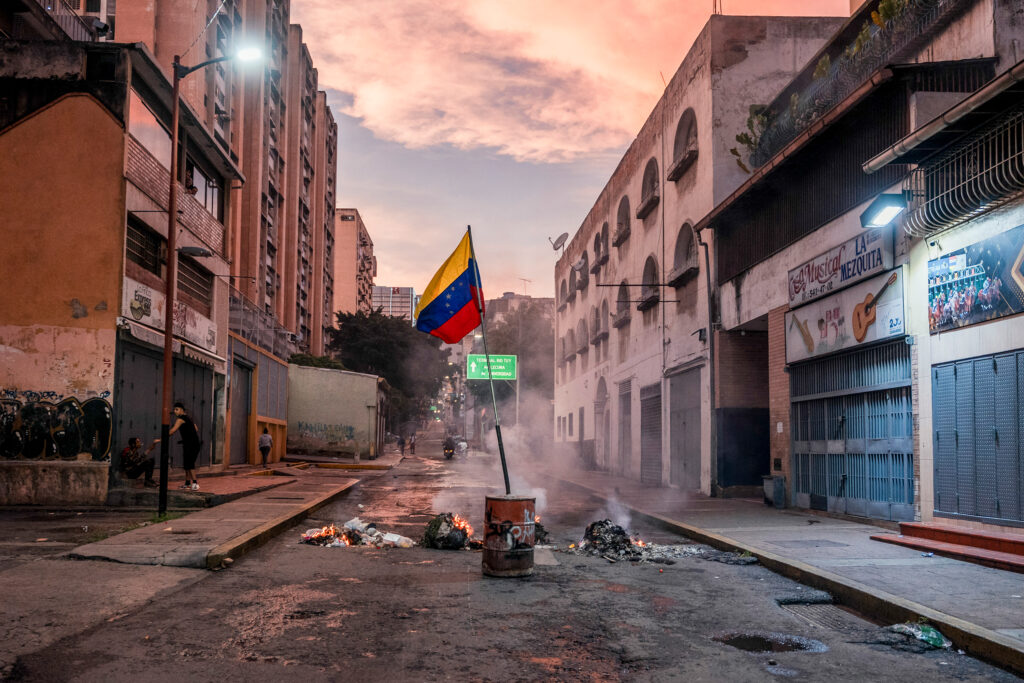
Odious Comparisons
So what is Venezuela’s political regime? One possible point of reference is the system created by the Institutional Revolutionary Party (known as PRI) in Mexico during its seven-decade reign. Mario Vargas Llosa famously called it “the perfect dictatorship,” an authoritarian regime with spaces of freedom that opened and closed according to the circumstances. But the differences between Mexico and Venezuela also are important. Largely because the PRI was a product of the 20th century (and Chavismo is a product of the 21st century), it was able to almost institutionalize its authoritarianism through a series of rules—notably requiring presidents to serve only one term but also allowing outgoing presidents to select their successors.
Another possible point of reference, which incorporates an economic dimension into the analysis, are the political regimes of resource-rich countries. In a book published last year, Venezuela: An Essay on Decomposition, I explain that there is a relationship (though not a linear one) linking a country’s productive structure, the society formed around that economy and the political system by which it is governed. Because a rentier state depends on a single natural resource, it does not need a broad fiscal base, which would ultimately require some level of social consensus from the people who pay taxes. As a result, such a state is somewhat autonomous from society and once a leader, clan or political group takes it over, they are unlikely to relinquish power. The vast, fast-flowing resources at the leaders’ disposal enable them to create clientelist structures, control the bureaucracy and buy the loyalty of the armed forces. Norway cannot be considered a pertinent counterexample to this scenario, because Norway was already a democratic and developed country when it started producing oil. The dictatorships of the Middle East—and to some extent Russia—are more useful references: Their leaders remain in power indefinitely; their armed forces are more akin to a political player than a professional defense corps; widespread corruption secures loyalties.
The Maduro regime can also be compared to illiberal democracies, or democratically elected governments that disregard constitutional limits on their power and trample citizens’ liberties. Through a series of maneuvers that are borderline (or outright) illegal, they diminish—or even eliminate—the republican dimension of democracy, namely the separation of powers designed to check the concentration of power. In many cases, they also threaten the liberal dimension of democracy by violating the rule of law. Leaders who are both very popular and highly authoritarian, such as Recep Tayyip Erdoğan in Turkey, Viktor Orbán in Hungary and Jarosław Kaczyński in Poland, built illiberal regimes that maintained certain electoral structures, but with the scales tipped in favor of the ruling party.
In How Democracies Die, an academic book from 2018 that unexpectedly became a bestseller, the Harvard professors of government Steven Levitsky and Daniel Ziblatt argued that today democracies collapse not from a single lethal shot, but from a slow bleed. Last century, a military coup or a revolutionary takeover would mark a clear break—the precise moment when Salvador Allende’s Chile or Isabel Perón’s Argentina ceased to be democracies. Now, democracy begins to die, often without anyone noticing, when a leader with an authoritarian vocation undermines from within the mechanisms that are supposed to guarantee its nature. I find this theory to be a valuable description of democratic reversion, but it fails to fully explain the root causes. It doesn’t explain why Hungarians have kept voting for Orbán or Americans for Trump—or Venezuelans for Chavistas.
The approach of political scientist Yascha Mounk is more interesting to me. In The People vs. Democracy: Why Our Freedom Is in Danger and How to Save It (2018), he defines the problem as twofold. On the one hand, there are illiberal democracies, in which leaders with popular support begin to rule as they please, trampling institutions and rights. On the other hand, according to Mounk, there is “undemocratic liberalism”—or democracies in which individual rights and liberties are mostly respected but their political rights are curtailed by technocratic or oligarchic tendencies: The people’s sovereignty is undermined because real power resides elsewhere (in, for example, the markets or the IMF, Wall Street or Brussels). Illiberal democracies are “democracies without rights,” Mounk says, and undemocratic liberalism is a regime of “rights without democracy.” Illiberal democracy is sometimes a response to undemocratic liberalism: When a society feels that it can no longer determine its own fate or shape its own future, it elects leaders who promise fundamental, even destructive, change.
Adam Przeworski, a leading Polish-American political scientist, makes a similar point. In his 2019 book Crises of Democracy, he explains that democracies work well when the stakes of securing power are “neither too low nor too high.” The stakes are too low when election results are of no consequence to citizens (or when citizens feel that way)—when things will remain more or less the same however people vote. And the stakes are too high, according to Przeworski, when an election loss will be intolerable for the losers—when the contest is a wager not only for a handful of seats in parliament or a switch in government, but for the contestants’ very freedom or even their lives. In such cases, incumbents might be willing to do anything to retain power… and the opposition, anything to gain it.
The Mounk and Przeworski models describe Venezuela’s transformation quite well. In 1958, after the fall of Marcos Pérez Jiménez’s dictatorship, the country’s three dominant political parties signed the Punto Fijo Pact. The arrangement ensured their equal participation in any presidential cabinet, giving each an interest in maintaining the new democratic system. And it ushered in four decades of economic modernization and oil industrialization, allowing the expansion of the middle class, a long period of political stability, and a measure of social peace rooted in power-sharing. It protected Venezuela from the democratic breakdowns and military coups that afflicted most of Latin America for years.
But after the late 1970s, Venezuela’s economic model started to run out of steam; poverty and inequality increased and the government’s power-sharing model was unable to respond effectively. Although republican formalities, elections, and human rights were still respected, real power no longer resided in the people; now it was vested beyond them, in the managers of the state-owned oil and gas company (the Brussels of pre-Chávez Venezuela) and in a ostentatiously corrupt elite. One might say, borrowing Mounk’s definition, that this was an example of undemocratic liberalism: No matter whom Venezuelans voted for, they experienced only more economic crisis and more austerity. Or, as Przeworski would put it, the electoral stakes had become too low. Then came Chávez, who delivered the final blow to a system that was already on life support. And after that, the stakes became too high.
The Chávez in Maduro
Even if the root causes of Venezuela’s democratic decline can be traced to the end of the Punto Fijo Pact, a new, and entirely different, era began with Chávez. After the 2002 coup attempt, there was the opposition’s oil strike in 2002–03, its decision to contest its defeat in the 2004 referendum, its abstention in the 2005 legislative elections and its routine accusations of fraud. Chávez adopted all kinds of authoritarian behaviors, but the opposition often was no better and some of its practices arguably were even less democratic. The main question is: To what extent did the regime Chávez built lead to what has followed?
Margarita López Maya, a historian and leading figure of Latin American social sciences, told me in 2023: “I believe there were authoritarian elements from the beginning. For example, in 2000, Chávez had a majority in the Assembly and, even so, he had laws passed to empower him to make decisions on his own. Of course, when the 2002 coup attempt came and we saw the true colors of the right-wing hardliners, many of us were fearful and thought that given the choice between them and Chávez, it was better to continue with Chávez.” López Maya met Chávez before he became president and initially was sympathetic to him; he chose her to be the keynote speaker at the plenary session of the National Assembly in 2004. In 2010, she ran for a seat in the lower chamber of Congress with the Patria Para Todos (Fatherland For All) party, which defended a policy of agreements between the government and the opposition, but ultimately she ended up distancing herself from Chávez’s regime. She explained to me: “Many of these authoritarian elements were exacerbated over the years. The first milestone was when in 2005 Chávez began to talk about Socialism for the 21st Century, something that no one was very interested in—to the point that it was defeated in the 2007 referendum, and later he implemented it by other means.”
I asked her, “Is Madurismo a natural consequence of Chavismo?” She answered: “I wouldn’t go so far as to say that: There is always room for different things to happen. After the 2013 elections, which Maduro won by less than two percentage points, it was clear that he didn’t have the legitimacy that Chávez had enjoyed. But instead of implementing a more open policy or of calling on the opposition, Maduro turned to the military. The result has been a regime like other autocracies today, which are different from the classic dictatorships of the 20th century. They are something more sophisticated and more subtle, but in some respects, too, just as repressive.”
Authoritarianism through Chaos
The hallmark of Venezuelan authoritarianism is chaos; its first cousins are clientelism and corruption, which manifest in the arbitrary rules imposed on Venezuelans. To ensure the loyalty of its vast military Maduro has made liberal use of promotions. He has not only appointed top commanders to key positions outside the military, but he has also allowed them to take over, say, the retail sale of gasoline at service stations. Filling up a car tank at the subsidized price—using your Homeland Card QR code, pegged to your license plate number—costs about five dollars. To avoid the endless lines at those refueling points, most service stations have also set up faster queues where a “toll” (read, bribe) can be paid to the person in charge—generally a low-ranking official. Such perks, widely distributed throughout society, have a clear objective: to raise the cost of regime change for all members of the military, from generals heading ministries to captains pocketing a few extra dollars at gas lines.
The chaos of the regime is also evidenced by some political decisions that seem inexplicable. Take the confusing episode of the arrest and subsequent release of María Corina Machado after a Jan. 9 protest against Maduro’s reinauguration. If the objective was to imprison her, as with other politicians and activists, it’s not clear why she was released. And if the authorities never really meant to take her to jail, why did they arrest her at all? The operation can only be explained by prevailing disorder in the chain of command. The same goes for the decision to allow the main opposition to even field a presidential candidate. If remaining in power is the administration’s main goal, disqualifying opponents before the ballot—as it did with Machado and then her first proxy—would have been much less costly. Again: Chaos seems to be the ultimate explanation.
A note of caution, however. Even chaotic authoritarianism can be effective, and it seems to have been for the Chavistas. Venezuela is no failed state. It may not be able to provide quality public services—or even deliver basic state functions like stabilizing the country’s currency (hence dollarization) or securing the state’s monopoly on force (hence criminal gangs). But, driven by the imperative to survive, it remains a strong state when it comes to deploying social surveillance or intelligence services to detect and neutralize dissidence. After the last presidential election in July, Maduro’s camp and the military have remained loyal. No street protests have forced the government’s hand into negotiating some agreed solution. The regime is isolated internationally but not absolutely so, thanks to the support of Russia and China, of Iran, Turkey and India. Maduro may actually have lost the election, but he is still winning the political battle.
José Natanson is is a journalist and politician, he directs Le Monde Diplomatique, Southern Cone Edition, and the editorial department of the Insud Group. His latest book is Venezuela. Essay on Decomposition (Penguin)
